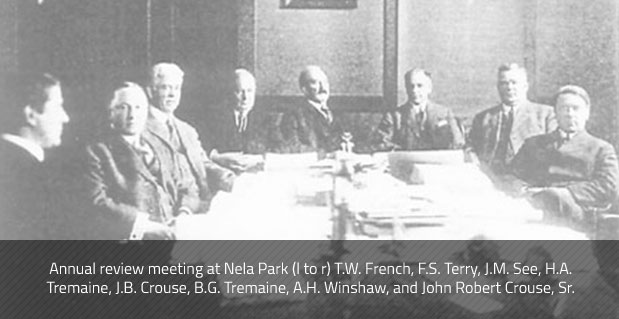
In 1931, Mr. J. Robert Crouse, Sr. turned his back on an industrial conglomerate which had made him a millionaire and returned to his birthplace - Hartland. He came back to give form to his dream, The Hartland Area Project. To trace the colorful history of the early lighting and electrical industry we need to begin with his father J.B. Crouse and his uncle, H.A. Tremaine into Fostoria. This manufacturing institution was first known as Crouse and Tremaine Carbon Works, then as National Carbon Company and again later as Union Carbide Company.
Mr. Crouse and Mr. Tremaine had abundant business connections in Cleveland, Ohio. They later sold their carbon plant and Mr. Crouse was one of the first entrepreneurs to be interested in the use of electricity for he helped form the National Electric Lighting Association. The letters formed the plant name known as “Nela Park” (also referred to as the University of Electricity) in Cleveland, Ohio. They formed other companies such as the Fostoria Incandescent Lamp Company that made light bulbs. One type of bulb was manufactured under the name “Fostoria Mazda” and was made in various sizes. By 1907 they were manufacturing a complete line of electrical incandescent lamps for modern and special use.
Just as Crouse and Tremaine sold their carbon firms to a larger entity, their success now called for them to sell their glass operation in Fostoria. In 1910, the trademarks and buildings were assigned to the General Electric Company.
In 1911, J. Robert Crouse, Sr. developed an interest in and participated actively in the establishment of co-operative ideas for the promotion of better conditions throughout the electrical industry. The Society for Electrical Development Association was organized and created the slogan “All together, all the time, for everything electrical.” By 1913, after nine years of untiring energy, the Society for Electrical Development had, as its membership, 1,300 firms in all parts of the country.
Many honors from various organizations were bestowed upon John Robert Crouse, Sr. for his efforts in the electric lamp industry. Perhaps, the most distinguished award was the James H. McGraw Medal and Purse for Cooperation. It was given to Mr. Crouse in 1926 in recognition of his outstanding contribution to the advancement of cooperation in the electrical industry.
At the awards banquet at the Waldorf-Astoria Hotel in New York City, Mr. Crouse said: “Progress of all kinds is a battle of the intelligence with our hereditary traits. Heredity tends to chain us to the old way of doing things and heredity with its side-partner, tradition, seems pretty largely to dominate the average man and the average trade.” He concluded his remarks with these words: “The friendly spirit builds and the unfriendly spirit tears down, in our personal lives, in our companies, in our relationships to our industry and in mankind in general. Cooperation is the friendly spirit.”